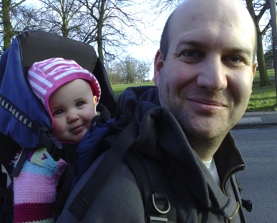We have written a fair amount here about back pain. We’ve criticised some of the information patients get, shown how data has undermined many widely held beliefs about back pain (here and here), and acknowledged the rather desperate state of the evidence in terms of treatment efficacy. It is becoming more popular to see back pain as a problem of pain rather than of the spine (see Jason Silvernail’s recent contribution) and since the Biopsychosocial model first rose to popularity, treatments aimed at altering the behaviour and beliefs of back pain sufferers to improve function have become common. Probably the best known of these approaches is Cognitive Behavioural Therapy (CBT).
Last year the Cochrane Review of behavioural treatments for chronic back pain was updated to include more recent studies. It drew the following conclusions:
- Operant therapy was more effective than waiting list for short-term pain relief
- little or no difference exists between operant, cognitive, or combined behavioural therapy for short- to intermediate-term pain relief (i.e. no type of behavioural approach is clearly superior)
- behavioural treatment was more effective than usual care for short-term pain relief
- there were no differences in the intermediate- to long-term, or on functional status
- there was little or no difference between behavioural treatment and group exercise for pain relief or depressive symptoms over the intermediate- to long-term;
- adding behavioural therapy to inpatient rehabilitation was no more effective than inpatient rehabilitation alone.
We could focus on a few positives in here but that would be to ignore some really pressing questions that arise for these treatment approaches.
In terms of effect size we can be fairly confident that the average effects on short term pain do not exceed a small 1 point change on a 10 point scale, and are likely to be less than that. Perhaps worse, for approaches that seek to help patients by teaching them long term self management skills, the lack of any measurable benefit beyond the immediate and short term is not encouraging. In fairness these approaches to not seek to treat pain, they seek to enable patients with pain to function more effectively.
But the real humdinger in here is that the data do not indicate any effect of behavioural intervention on functional status. Not for any comparisons. Focus on improving function is at the heart of these approaches and this seems a major blow. It is worth noting that there was not a lot of data for most of these comparisons and, as the authors suggest, it is likely that future research could change the conclusions.
We have discussed here before that the role of psychological variables in the course of back pain is currently not entirely clear. We shouldn’t conclude that these results from behavioural treatments invalidate the importance of cognitive and behavioural factors in back pain. It does not necessarily follow that the failure of a treatment directed at them implies that they are not important, just that our attempts to influence them may not be effective.
Nonetheless it seems that our current best estimates do not give a resounding slap on the back for behavioural treatments for chronic back pain. More likely they send them to the naughty step with a stern talking to. Meanwhile back pain gets to behave as badly as it likes. Where is Supernanny when you need her?
About Neil
 Neil O’Connell is a researcher in the Centre for Research in Rehabilitation, Brunel University, West London, UK. He divides his time between research and training new physiotherapists and previously worked extensively as a musculoskeletal physiotherapist. He also tweets! @NeilOConnell
Neil O’Connell is a researcher in the Centre for Research in Rehabilitation, Brunel University, West London, UK. He divides his time between research and training new physiotherapists and previously worked extensively as a musculoskeletal physiotherapist. He also tweets! @NeilOConnell
Neil is currently fighting his way through a PhD investigating chronic low back pain and cortically directed treatment approaches. He is particularly interested in low back pain, pain generally and the rigorous testing of treatments. He also tends to get all geeky over controlled trials.
Reference
Henschke N, Ostelo RWJG, van Tulder MW, Vlaeyen JWS, Morley S, Assendelft WJJ, Main CJ. (2010). Behavioural treatment for chronic low-back pain. Cochrane Database of Systematic Reviews (7)



